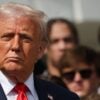The political debate over China seems familiar because they’ve been on the political table for years. Is China taking American jobs? How cooperative is the People’s Republic of China (PRC) on issues like nuclear programs in North Korea and Iran? China rises; America frets, and Presidential candidates talk about roughly the same things every four years.
But what if China is about to change?
By the time America holds its presidential election next year, China will have begun a leadership transition of its own. The current leadership group headed by Hu Jintao and Wen Jiabao will give way to the so-called “fifth generation” of leaders, currently projected to be led by Xi Jinping, Li Keqiang, and Wang Qishan.
The Daily Signal depends on the support of readers like you. Donate now
This new group will lead a China that, on the one hand, has enjoyed nearly three decades of strong growth. This has permitted not only a much higher standard of living but also military modernization — in short, both guns and butter. It has also permitted eye-catching new capabilities, ranging from a space lab to a fleet of hospital ships to major investments in Africa. On the other hand, the new leadership will be increasingly confronted by popular unrest, environmental degradation, and threats to much-needed economic development. The next American President will have to deal with a new Chinese leadership and, quite possibly, a new PRC.
Perhaps China’s new leaders will grapple successfully with the challenges they face. If the PRC deals with domestic discontent, reinvigorates economic reform, and reaches a long-term understanding with its neighbors, it would be a far more benign partner. At the same time, however, it would be far more powerful and influential globally. This would be a Beijing whose model — the “Beijing consensus” – would be seen as a real alternative to the American dream. In short, one possibility is a China that poses a greater challenge to all aspects of U.S. leadership, even as it was more benign.
Another possibility is a PRC which fails to resolve its many problems. Confronted with a stagnant economy and growing domestic unrest, the next Chinese leadership may choose to emphasize nationalist themes and be more repressive at home and aggressive overseas. This would be a China that poses less of a real challenge to American preeminence, but becomes more threatening to American friends and allies in the region and more inimical to American values.
Our political discussions of China assume that the future mostly holds more of the same. However, the next President could very well be facing a quite different China. Which of these possibilities – a friendlier China that is a true peer to the U.S. or a struggling, dangerous China – would be a greater challenge? It is an open and important question.
This post originally appeared on CNN’s Security Clearance blog.





























